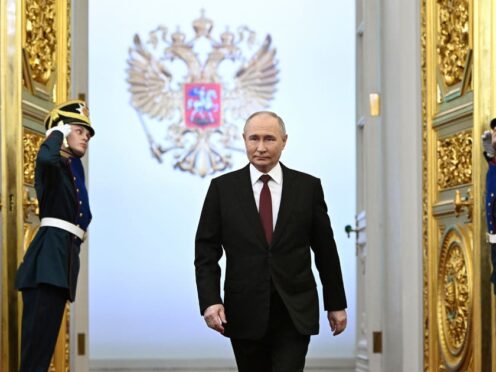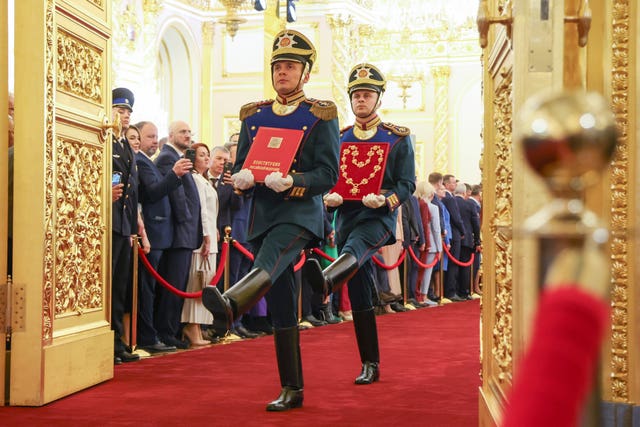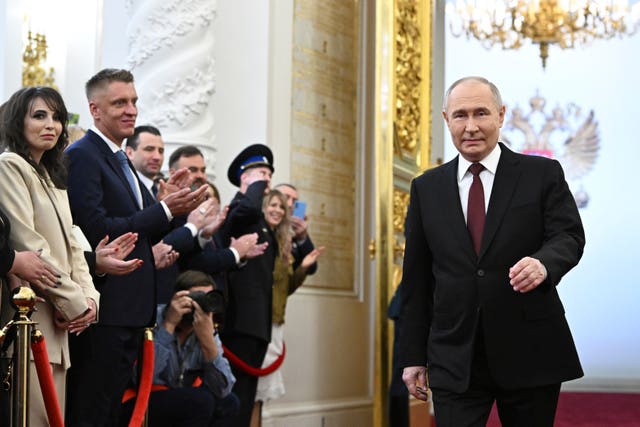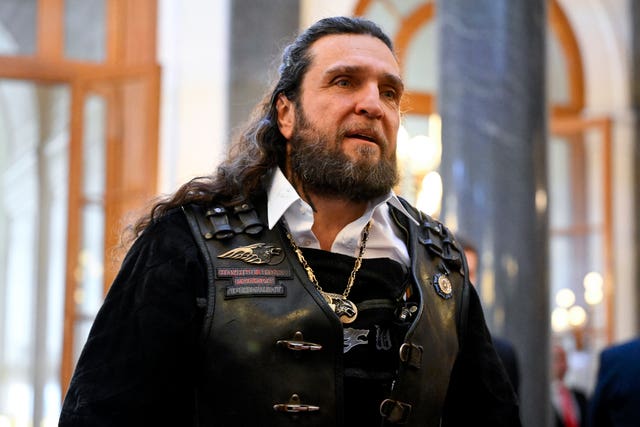
Vladimir Putin began his fifth term as Russian leader at a glittering Kremlin inauguration, setting out on another six years in office after destroying his political opponents, launching a devastating war in Ukraine and concentrating all power in his hands.
Already in office for nearly a quarter-century and the longest-serving Kremlin leader since Josef Stalin, Mr Putin’s new term does not expire until 2030, when he will be constitutionally eligible to run again.
At the ceremony inside the gilded Grand Kremlin Palace, Mr Putin placed his hand on the Russian Constitution and vowed to defend it as a crowd of hand-picked dignitaries looked on.
“We are a united and great people and together we will overcome all obstacles, realise all our plans, together we will win,” Mr Putin said after being sworn in.
He used the the first moments of his fifth term to thank the “heroes” of his war in Ukraine and to rail against the West.
Russia “does not refuse dialogue with Western states”, he said.
Rather, he said, “the choice is theirs: do they intend to continue trying to contain Russia, continue the policy of aggression, continuous pressure on our country for years, or look for a path to cooperation and peace”.
Since succeeding President Boris Yeltsin in the waning hours of 1999, Mr Putin has transformed Russia from a country emerging from economic collapse to a pariah state that threatens global security.
Following the 2022 invasion of Ukraine that has become Europe’s biggest conflict since the Second World War, Russia has been heavily sanctioned by the West and is turning to other regimes like China, Iran and North Korea for support.

The question now is what the 71-year-old Mr Putin will do over the course of another six years, both at home and abroad.
Russian forces are gaining ground in Ukraine, deploying scorched-earth tactics as Kyiv grapples with shortages of men and ammunition.
Both sides are taking heavy casualties.
Ukraine has brought the battle to Russian soil through drone and missile attacks, especially in border regions.

In a speech in February, Mr Putin vowed to fulfil Moscow’s goals in Ukraine, and do what is needed to “defend our sovereignty and security of our citizens.”
Shortly after his orchestrated re-election in March, Mr Putin suggested that a confrontation between Nato and Russia is possible, and he declared he wanted to carve out a buffer zone in Ukraine to protect his country from cross-border attacks.
At home, Mr Putin’s popularity is closely tied to improving living standards for ordinary Russians.
He began his term in 2018 by promising to get Russia into the top five global economies, vowing it should be “modern and dynamic”.

Instead, Russia’s economy has pivoted to a war footing, and authorities are spending record amounts on defence.
Analysts say now that Mr Putin has secured another six years in power, the government could take the unpopular steps of raising taxes to fund the war and pressure more men to join the military.
At the start of a new term, the Russian government is routinely dissolved so that Mr Putin can name a new prime minister and Cabinet.
One key area to watch is the defence ministry.
Last year, defence minister Sergei Shoigu came under pressure over his conduct of the war, with mercenary leader Yevgeny Prigozhin launching withering criticism against him for shortages of ammunition for his private contractors fighting in Ukraine.
Mr Prigozhin’s brief uprising in June against the defence ministry represented the biggest threat to Mr Putin’s rule.
After Mr Prigozhin was killed two months later in a mysterious plane crash, Mr Shoigu appeared to have survived the infighting.
But last month, his protege, deputy defence minister Timur Ivanov, was detained on charges of bribery amid reports of rampant corruption.
Some analysts have suggested Mr Shoigu could become a victim of the government reshuffle but that would be a bold move as the war is still raging in Ukraine.
In the years following the invasion, authorities have cracked down on any form of dissent with a ferocity not seen since Soviet times.
There is no sign that this repression will ease in Mr Putin’s new term.
His greatest political foe, opposition leader Alexei Navalny, died in an Arctic penal colony in February.
Other prominent critics have either been imprisoned or have fled the country, and even some of his opponents abroad fear for their security.
Laws have been enacted that threaten long prison terms for anyone who discredits the military.
The Kremlin also targets independent media, rights groups, LGBTQ+ activists and others who do not adhere to what Mr Putin has emphasised as Russia’s “traditional family values”.

Enjoy the convenience of having The Sunday Post delivered as a digital ePaper straight to your smartphone, tablet or computer.
Subscribe for only £5.49 a month and enjoy all the benefits of the printed paper as a digital replica.
Subscribe